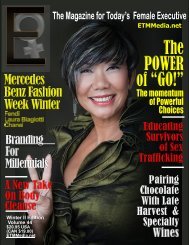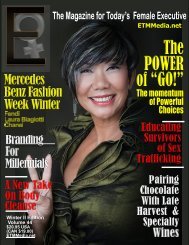E The Magazine For Today's Female Executive August 2018 issue
The theme for this month's issue of E The Magazine for Today's Female Executive is "Jump out of The Box!" Featuring Innovators and Social Change Agents. We have awesome book reviews, coaching series,
The theme for this month's issue of E The Magazine for Today's Female Executive is "Jump out of The Box!" Featuring Innovators and Social Change Agents. We have awesome book reviews, coaching series,
You also want an ePaper? Increase the reach of your titles
YUMPU automatically turns print PDFs into web optimized ePapers that Google loves.
Other social movements include labor,<br />
feminism, environmental, gay and lesbian,<br />
animal rights, and disability. Movements<br />
provide an important context for<br />
activism in several ways. <strong>The</strong>y constitute<br />
a network of individuals and groups that<br />
is a source of communication, advice<br />
and inspiration. <strong>The</strong>y provide a learning<br />
environment, with activists drawing on<br />
the experience of other groups to discover<br />
possible solutions. <strong>The</strong>y provide a<br />
framework or perspective for understanding<br />
society, its problems, possible<br />
futures, and ways of bringing about<br />
change. This framework, or belief system,<br />
develops out of the experience of<br />
activists, combined with the ideas of<br />
Page 151 E <strong>The</strong> <strong>Magazine</strong> for Today’s <strong>Female</strong> <strong>Executive</strong><br />
writers and leaders; some who are part<br />
of the movement and some who are<br />
largely independent of it.<br />
<strong>For</strong> example, the feminist movement has<br />
supported activism through the network<br />
of individuals and groups, has fostered<br />
learning about tactics, and has offered<br />
an understanding of the problem of patriarchy<br />
through women sharing their experiences<br />
and through feminist writers presenting<br />
ideas that illuminate and inspire<br />
their readers.<br />
<strong>The</strong> Women’s March on Washington was<br />
unprecedented in scale as a social<br />
movement, not just in sheer volume of<br />
attendees, but in the array of <strong>issue</strong>s it<br />
encompassed, and the diversity at all<br />
levels of leadership, from national to local.<br />
<strong>The</strong> executive director of the Arab American<br />
Association of New York, Linda Sarsour<br />
— a Brooklyn native, mother of<br />
three, and now one of the national cochairs<br />
of the Women’s March on Washington<br />
held this past January, has been working at<br />
the crossroads of civil rights, religious freedom,<br />
and racial justice for 15 years. Once an<br />
aspiring English teacher, she joined the Arab<br />
American Association in its infancy, succeeding<br />
founder Basemah Atweh, her mentor, as<br />
executive director with Atweh’s death in 2005.<br />
In a recent interview with Katherine Cusumano<br />
for W <strong>Magazine</strong> in the article, “<strong>The</strong> Women of<br />
the Women's March: Meet the Activists Who<br />
Are Planning One of the Largest Demonstrations<br />
in American History,” “I grew out of the<br />
shadow of 9/11,” Sarsour said. “What I’ve seen<br />
out of bad always comes good, is that solidarity<br />
and unity, particularly amongst communities<br />
of color who feel like they’re all impacted by<br />
Subscription link ETMMedia.net<br />
the same system.”




